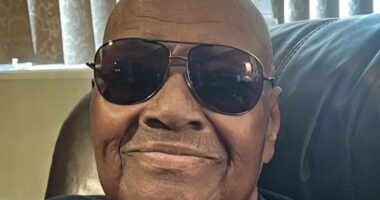When Rick and Terri Black received a check from her father for their son’s high school graduation in someone else’s handwriting, it led them to something even more concerning: His longtime companion had transferred about $200,000 of his money into a joint bank account she shared with him.
When they asked Terri Black’s father, Delford Mencarelli, who was becoming increasingly impaired by Alzheimer’s disease, and his companion, Helen Natko, about the transfer, a confrontation ensued that led to a fight for his guardianship. In court documents, Natko said she had made the bank transfer to pay for Mencarelli’s health care costs and knew his medical needs best.
Ultimately, the guardianship commissioner overseeing the case said Mencarelli’s disability, which made him confused and agitated when around unfamiliar people and places, meant he should stay in Las Vegas with Natko as his guardian rather than go to the Blacks’ home in North Carolina.
The recommendations, signed by a Nevada district judge, ordered Mencarelli’s money be safeguarded in a special account with the periodic release of funds for his monthly needs allowed only by court order and any remaining balance to be inherited by Terri Black upon her father’s death. The commissioner also found that despite the Blacks’ allegation that Natko converted some of Mencarelli’s money for her personal benefit, the evidence presented “was insufficient to support a finding of misappropriation of the ward’s assets by Helen.”
The Blacks say the court’s decisions, which also involved the appointment of a professional guardian, led to Mencarelli’s isolation from his family, including monitored phone calls. The next time the Blacks said they were alone with him was months later, when he was admitted to a Las Vegas hospital in 2015. By the time the 84-year-old died some weeks after that, the Blacks and Natko had been tangled in court proceedings for more than two years.
“What we did attempting to protect her dad was an odyssey that I thought couldn’t happen in our country,” Rick Black said.
Natko could not be reached for comment, but a lawyer who represented her in court proceedings, Daniel Foley, said Terri Black “presented no evidence that she was a fit guardian or that it would be in Del’s best interest to leave his home for the past decade and his monogamous life partner of 30 years.”
The Blacks have since formed the nonprofit Center for Estate Administration Reform to push for changes to the guardianship system in the United States, which has received national attention amid pop star Britney Spears’ legal fight to remove her father from her conservatorship. The publicity surrounding Spears’ ordeal and the resulting #FreeBritney movement have given state and federal reform efforts a much-needed jolt, advocates say.
Legislative action
As many as 1.3 million people with disabilities are under guardianships or conservatorships in the United States, putting their health care, finances or other aspects of their lives under the court-ordered control of someone else, according to a 2018 report by the National Council on Disability. Despite the estimated number, very little information on guardianships is tracked by the government, the report said.
As the U.S. population ages, elder abuse under such arrangements is increasingly a concern to policymakers, although, again, the extent of the problem isn’t known, a 2016report by the Government Accountability Office said. Those under guardianships rarely have their rights restored, according to the American Bar Association Commission on Law and Aging.
The Spears saga has captured the attention of Republican and Democratic lawmakers alike. In the House, Charlie Crist, D-Fla., and Nancy Mace, R-S.C., have proposed what Crist spokesperson Grace Wright described as “an escape hatch for those stuck in abusive and exploitative situations.”
Under their bill, dubbed the FREE Act, states that keep databases of all guardianships and conservatorships would be eligible for grants to assign caseworkers and, when needed, public guardians to those cases.
A separate bill introduced by Rep. Jason Smith, R-Mo., would limit conservators’ authority over their charges’ birth control — an issue for Spears, who alleged her conservators prevented her from removing her intrauterine device.
In the Senate, Elizabeth Warren, D-Mass., and Bob Casey, D-Pa., have asked the Biden Justice and Health and Human Services departments about what systems exist to collect information on guardianship demographics, complaints and other data. Casey also plans to reintroduce a billin September that would create an online database of guardianship information, including best practices, training materials and a compilation of state laws.
In California, meanwhile, Assemblyman Evan Low introduced legislation to require professional overseers of others’ estates to post their fees online and establish punishments for conservatorship abuses. It also aims to eliminate conflicts of interest in which conservators are paid for legal fees out of their charges’ estates. The measure passed unanimously in the Assembly and is now pending before the state Senate.
Alternative models
Rick Black, who has worked with lawmakers on federal reforms, said he would like to see legislation emphasize guardianship as a last resort and allow those with disabilities to make more decisions.
Many advocates back “supported decision-making” as an alternative to guardianships, using a team of advisers, like trusted friends and family, to help a disabled person make his or her own decisions.
Katherine Perez, executive director of the Coelho Center for Disability Law, Policy and Innovation at Loyola Marymount University, supports the model based in part on her personal experiences in the conservatorship system. Her sister, Cindy, has an intellectual disability and was placed under the conservatorship of their parents and Perez; while they have her sister’s “best interest at heart,” she takes issue with the fact that her sister “legally has no autonomy.”
“Ultimately, we can’t piecemeal our way out of this,” Perez said of reforms to conservatorships. “We need to take a deep, hard look at the deeply entrenched roots of ableism.”
About a dozen states and Washington, D.C., have passed laws establishing supported decision-making as legally enforceable arrangements. Casey also raised it as an alternative to some guardianships but said he leaned toward a limited role for the federal government.
“You can’t have a Washington-fits-all, one-size-fits-all … idea here,” he said.
Advocates are pushing for other changes, including greater enforcement of existing laws, to address cases in which lawyers and judges shirk their obligations to those in conservatorships or guardianships. State laws often require guardians to submit an annual report to the courts to ensure the arrangement is still necessary and monitor for abuses. But the monitoring “is widely acknowledged to be incredibly lax,” the National Council on Disability report said.
In Spears’ case, the lack of transparency in court proceedings makes it hard to know if the law governing her conservatorship was being complied with, said retired Judge LaDoris Hazzard Cordell, who presided over similar cases in California, but not that of Spears.
“We have no idea if the judge has kind of rubber-stamped” the conservatorship, Cordell said.
Rick Black called the system in Nevada that he and his wife dealt with “a racket” driven by negligence and corruption.
A hidden problem
Perez said it’s frustrating that many people are “only now learning about the horror of the conservatorship system because of Britney Spears,” who testified that at one point she was forced to take psychiatric medication. Perez said the pop star’s case could spur those with mental health issues — including herself — to get involved with reforms.
“We get invested when we know the system could come after us,” she said.
Rick Black, who recently attended a #FreeBritney virtual town hall on Crist and Mace’s bill, said, “The educational process that goes along with legislation helps us to educate more and more leadership.”
With the widespread attention Spears’ case has brought to the issue, he said, he’s been “wearing a smile every day” since the pop star testified.
“We needed more eyes and ears open,” he said, “and Britney did that.”
Source: | This article originally belongs to Nbcnews.com











